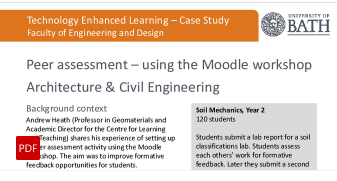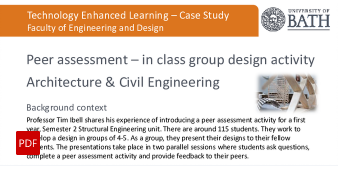![]() Welcome to our short blog series as we highlight learning activities and technologies you want to know more about. This month we'll tell you about...
Welcome to our short blog series as we highlight learning activities and technologies you want to know more about. This month we'll tell you about...
Peer assessment
 Peer assessment is when students assess and provide feedback on each others' work. Another approach is peer review, where students provide formative feedback to each other. Peer assessment (summative) or peer review (formative) activities can take place:
Peer assessment is when students assess and provide feedback on each others' work. Another approach is peer review, where students provide formative feedback to each other. Peer assessment (summative) or peer review (formative) activities can take place:
- online or face to face
- for group or individual work
There are many tools which support peer assessment activities. Some commonly used tools include the Moodle Workshop, which allows students to read, review and grade submissions by peers. WebPA is an open source web based system designed specifically for peer assessment of group work.
 Peer assessment or peer review activities can have many benefits. Peer assessment is a student-centred approach which gives students a central role in the assessment and feedback cycle.
Peer assessment or peer review activities can have many benefits. Peer assessment is a student-centred approach which gives students a central role in the assessment and feedback cycle.
- Students engage with and develop a greater understanding of the assessment criteria. This can be further extended where student co-develop the assessment criteria.
- Students develop the skills to reflect on and evaluate their own work
- Students learn from formulating feedback to their peers
- Students receive a broader range of feedback from multiple peer assessors, who are working on a similar task, and are at a similar stage in learning
- For group work, it can address the risk of unfairness in awarding a single group mark, as it allows for assessment of individual effort and contributions to group work
 Carefully designing the peer assessment or peer review activity is crucial. Students need to understand the purpose of peer assessment, and what is expected of them.
Carefully designing the peer assessment or peer review activity is crucial. Students need to understand the purpose of peer assessment, and what is expected of them.
The following principles, constructed by Nicol (2013) taking account of research literature, provide a framework for good practice in peer review
- Encourage an atmosphere of trust
- Use a range of perspectives for reviews
- Give practice in formulating criteria
- Require explanations for feedback responses
- Facilitate dialogue around reviews
- Integrate self-reviews
- Encourage evaluation of received reviews
- Help learners calibrate their judgements
Once you have designed your activity, you will need to consider the best tool to facilitate it. This depends on how you want to allocate reviews (random or tailored), the typed of work to be assessed (written assignment or face-to-face presentation, for example), and whether students are assessing individual submissions or group work, amongst other factors.
 The following case studies provide examples of different approaches to Peer Assessment in the Faculty of Engineering and Design at the University of Bath.
The following case studies provide examples of different approaches to Peer Assessment in the Faculty of Engineering and Design at the University of Bath.
Peer assessment using the Moodle workshop tool
Professor Andrew Heath (Architecture and Civil Engineering) shares his findings of a formative peer assessment exercise using the Moodle workshop tool. Select the image below to access the case study.
For further reading, you may find this case study by Mira Vogel at UCL of interest. It looks at development of a peer assessment activity using the Moodle workshop, and describes the improvements which were made over three iterations of the workshop.
Peer assessment for a group design activity
Professor Tim Ibell (Architecture and Civil Engineering) explains how he facilitates peer assessment of group design presentations in class using a Moodle database for students to record marks and feedback. Select the image below to access the case study.
The Guide to Peer Assessment by Dr. Michael Wride, University of Dublin Trinity College, also gives a good starting point if you are thinking of introducing peer assessment.
 Before you begin, discuss any proposed changes to assessment activities with your programme team. You may also find it useful to talk to colleagues with experience of peer assessment. You can get advice from the Faculty Learning Enhancement Adviser (Tracey Madden) and from the Centre for Learning and Teaching to help plan your assessment activity.
Before you begin, discuss any proposed changes to assessment activities with your programme team. You may also find it useful to talk to colleagues with experience of peer assessment. You can get advice from the Faculty Learning Enhancement Adviser (Tracey Madden) and from the Centre for Learning and Teaching to help plan your assessment activity.
Your Faculty Learning Technologists can work with you to identify the best tools to use in your context. Do get in touch at fed-tel@bath.ac.uk
Images created using Piktochart
Reference
Nicol, D. (in press) Guiding principles for peer review: Unlocking learners' evaluative skills, In Advances and Innovations in University Assessment and Feedback, eds C. Kreber, C. Anderson, N. Entwistle and J. McArthur, Edinburgh University Press. http://www.reap.ac.uk/PEERToolkit/Design.aspx

